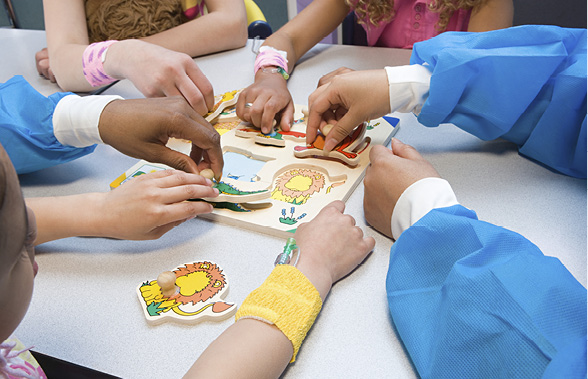Spending time with others
As your child nears the end of life, it will comfort them to spend time with the people who are important to them. Being together will also help siblings, friends and relatives deal with the approaching death. This section talks about some ways you might prepare visitors and help your child.

As death comes closer, your child’s condition will change. It will be harder for them to do the same kinds of activities with friends and family that they used to do. They may feel weaker and sleep more. They will likely lose interest in having meals or snacks with the family, because as their body shuts down it won’t need food and drink as it did previously. But, even if your child doesn’t wake up at all, they may be able to hear and know who is with them. If they are in a lot of pain, it’s better to wait to have visitors after the pain is controlled.
Important people should be encouraged to visit and be with your child, but warn them that you may have to change plans at the last minute if your child feels too tired or uncomfortable.
Read more
Your healthcare team will do their best to help your ill child feel comfortable as the end of life approaches. Here are some ways you can help your child:
- Spend time together. Go to the park, have a movie night, or sit outside in the sun. Create some happy memories for your family.
- Follow your routines as much as possible. Continue to set limits about how your child behaves. These expectations will help your child feel safe and more in control at a time when everything feels out of control.
- Help your child set a goal such as reading a new book or making a video for friends. Short-term goals can help them feel proud and may add meaning to their lives.
- Ask your child if they have any wishes. As the end of life approaches, they might want to spend time with family members, give away special belongings, or create messages for friends.
- Help your child to connect with friends and important people in their lives. Arrange a visit to school, or invite a friend over. If your child is too ill, ask friends to write notes or call. If they are older, try to give them some privacy to be alone with their friends.
- Help your child say goodbye to family, friends, teachers, or other special people. This could happen in person or by writing a letter or making a video or recording.
Read more
As death comes closer, siblings may feel better if they have a chance to spend time with the child who is dying. If they are not included, they may feel left out and think that no one cares about them.
“Ella, Keaton's younger sister had visited him in the hospital the day he died, but was not there for the death. He was sitting up playing with her. Then he got tired. Ella was squirmy, kept hugging him but got really squirmy. I think they innately knew something was not right. Ella went home and my sister who was with her told me that at the exact time Keaton passed, Ella shot up out of bed. I wish we were all together, but the environment didn’t lend itself to that.” – Danielle, mother of Keaton
It’s hard to know how much your other children should be part of the end-of-life process. This decision will depend on their understanding of what’s happening, on their personalities, and on their own feelings and wishes. Here are some ways to help:
- Talk openly about the changes that happen as death approaches. Your healthcare team can help you know what to say. If you wish, they can talk directly to your children.
- Give your other children choices about when and how they would like to be with your ill child.
“When Tyler was dying, we asked his brother if he wanted to be there. He came and was there when Tyler passed but we gave him the choice.” – Darren, father of Tyler
- If they don’t want to visit, do not force them. Try to find out why they don’t want to visit to clear up any misunderstandings or fears. If they still don’t want to visit, find another way for them to have a connection. For example, ask them to make a picture or write a note or arrange a telephone or video call.
- Plan for breaks. If your child needs a break from a hospital or home visit, make a plan about where they can go. Ask a friend or family member to be a support person for them.
- Talk about what your other children can do during the visit even if the ill child is asleep or not responding. Some ideas are:
-
- Tell stories about something that happened at school or during the day
- Tell stories about favourite things they did together
- Sing a song, play an instrument, or recording
- Watch a movie in bed together
- Hold hands
- Rub cream on the ill child’s hands or feet
- Sit nearby doing a quiet activity like reading or drawing
- Plan ahead for the death. No one really knows when a death will happen. Talk to your other children about how and when they would like to be told about the death, if they are at school or asleep when it happens. For example, do they want to wait to be told until they come home from school? Do they want you to wake them up if it happens during the night?
Read more
- Children at the bedside of a dying family member or friend - Canadian Virtual Hospice
- When to tell the children: preparing children for the death of someone close to them - Canadian Virtual Hospice
Friendships are very important to children. Help your child stay connected with friends and classmates. Use some of the same ideas for helping siblings to help friends. You can also:
- Invite special friends to visit at home or in the hospital. If they can’t visit in person, ask them to write a letter, call, or connect by video.
- Ask your child’s teacher to have the class write letters, draw pictures, or make videos.
Family members and close friends may want to know what’s going on with your child’s treatment. But as your child’s life comes closer to the end, it may be harder to stay connected. Make a plan about how to share information with important people in your life. Here are some suggestions:
- Record a voicemail message that explains that you’re happy to hear from people but may not be able to return calls.
- Record a voicemail message that directs friends to call a family spokesperson who can tell them what’s happening.
- Set up a group email or blog.
- Choose one or two trusted people and ask them to share updates with the larger group.
You may need or wish to take time away from work to care for your child. If you do, you may be able to apply for the Compassionate Care Benefit from the Government of Canada. This benefit is for people who are caring for a person who is seriously ill and is likely to die within 6 months. Some employers also offer leaves from work. Talk to your social worker to learn more about financial supports.
Resources
- Caregiver and survivor benefits - Canadian Virtual hospice
- Compassionate care benefit - Government of Canada












